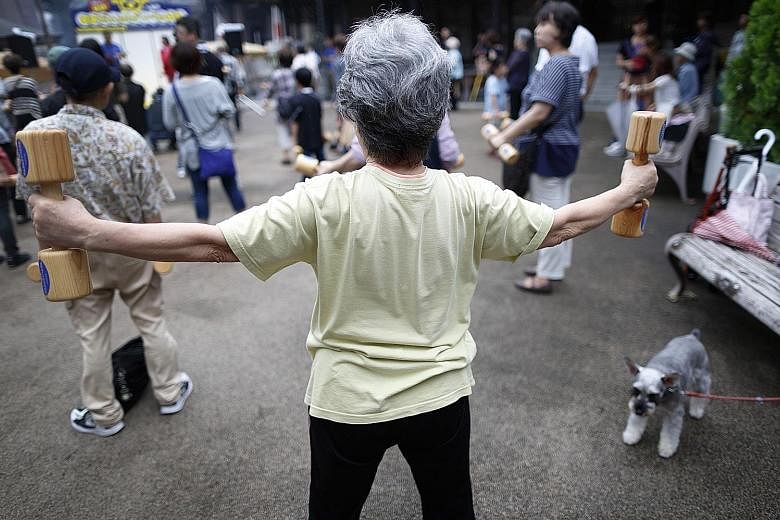TOKYO • When do you become a senior citizen?
That is an increasingly important question in Japan, demographically the world's oldest nation, where the challenge is to keep people healthy and productive as they live longer.
The answer should be 75, 10 years older than many people think now, according to two groups of medical experts who specialise in ageing.
People aged 65 to 74 ought to be thought of as "pre-old", the Japan Gerontological Society and Japan Geriatrics Society said in a report last month. "Old" would be better defined as 75-89, according to their study. A special label of "super-old" could be adopted for people aged 90 and above, they said.
While these experts approached the subject chiefly from a medical viewpoint, applying these definitions to the labour force could have profound economic implications, boosting the number of potential workers by more than 10 million.
Thanks to better nutrition, health care and sanitation, today's senior citizens are much fitter than past generations, and labelling them as retirees is a waste, said Dr Yasuyoshi Ouchi, one of the authors of the report. "There are many people who are older than 65 and are healthy and energetic," said Dr Ouchi, who himself is a spry 68. "They are willing to contribute to the society by working, whether paid or unpaid."
It is already happening. Mr Kunio Odaira, 72, spoons soup and fills teacups at the Cross Heart nursing home in Yokohama. He is not one of the residents, but one of the staff - part of an increasingly grey workforce. At Cross Heart, more than half of the 119 caregivers are over 60, and 15 of them are over 70.
A Japanese government survey of nearly 4,000 people aged 60 and over found that 51 per cent did not consider themselves senior citizens. Most said that the label should be for people 70 and older.
The Japan Times said the proposals are likely to spark discussions about reviewing the nation's social security systems - including the age at which one can start receiving pension money. That age rests on defining people 65 or over as elderly and retired or about to retire.
Faced with a shrinking labour force and rising welfare costs, the government is already gradually raising the starting age for receiving pension payments from 60 to 65.
"Social welfare systems for the elderly are not something decided based only on physical health aspects. They are also to do with things like seniors' income and housing situations," Waseda University social welfare professor Hiroko Kase told The Japan Times. "If the government delays the starting age for receiving state pension from the current 65 to 75, it also needs to think of ways for them to sustain their jobs up until that age."
If the government moves the retirement age up to 75, salaries are expected to shrink as many would not be capable of working with the same vigour they did in their 40s or 50s, she said.
The Japan Times reported that the Internal Affairs and Communications Ministry's estimates in September said roughly 27 per cent of the population was 65 or older. Changing the definition of elderly to 75 would halve the ratio of senior citizens to around 13 per cent.
"The government is the one responsible for creating the disastrous state of the social security system. It was aware of the issues for a long time but it just left them untouched... It surely cannot simply just slash (social security for the elderly) because now it is suffering from an ageing population," Professor Kase told The Japan Times.
Dr Ouchi, a medical doctor who is president of Toranomon Hospital in Tokyo, said it was not his intention to provide political cover for delaying pensions.
The aim of working longer is to stay active and healthy, and to contain soaring medical costs while lightening the burden on younger generations, he said.
BLOOMBERG, WASHINGTON POST

